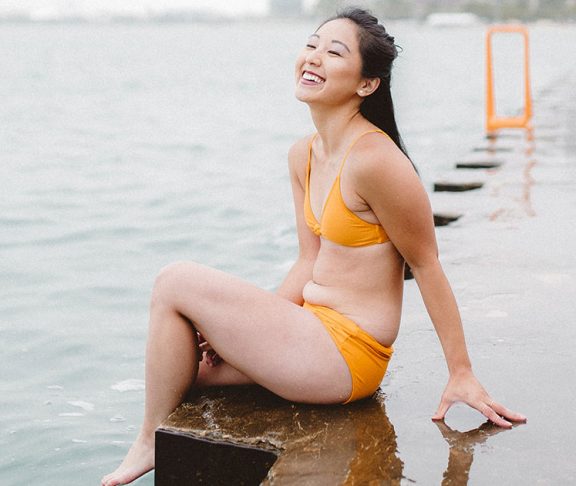Social Media Influencer and Body Positivity Advocate, Kelly U found her road to recovery by rethinking today’s beauty standards. Here, she opens up about the hurdles and triumphs.
What inspired you to be so open about your experience with eating disorders?
As soon as I realized how much I was struggling, I knew that there had to be at least one other person on this planet going through the same thing. My eating disorder journey started at a very young age, and at 10 years old, I really thought I was the only one like this. I felt so alone. So, when I had a good amount of followers, I figured I could try to save someone in the way I wish someone could’ve done for me.
Obviously social media can have a negative effect on young girls’ self-esteem when they are bombarded with images of unrealistic body ideals. How do you use social media differently to help spread your message of self-love and body empowerment?
Social media is an arena full of beautiful photos and eye-catching content, and I love to create that. What I also try to incorporate is more of a “real life” perspective and try to show that, hoping that people scrolling on their phones might catch something that feels relatable, makes them feel comfortable, and less alone in their daily lives. Too much content out there often makes consumers, including myself, feel lesser or not good enough.
My goal in almost every post I put out in the world is to show the beauty in being yourself, the treasures in getting to know your genuine self more, and the light that you can find even if you feel like you’re stuck in a dark tunnel. Showing my perfectly imperfect tummy, my blemished skin and all other beautiful imperfections truly is a message to my younger self. I wish she could’ve realized how wonderful it was back then.
What has your support system looked like throughout your recovery?
I have to hand it to my partner in life, Max. I don’t talk about him much, but he’s been in my life since I was 18. At the time, I was at an all-time low. College was the hardest time for my mental health. I spiraled deep into depression, anxiety, and my eating disorders took over my life. The stress of trying to be perfect and get straight A’s while maintaining two internships, a job, and washing dishes in the dining hall to pay off my college debt left me empty and truly broken. He encouraged me to talk to someone. He could tell I became a shell of a person, and he too also struggled with mental health, but was encouraged in his life to seek therapy. So, because of him, I did. I was hesitant and hated every session for about a year. I wasn’t ready to open up to myself. I felt so much shame and embarrassment for being “broken.”
But, I eventually became a dedicated member of the recovery community. Therapy twice a week, group therapy for at an eating disorder recovery center on the weekend, meeting with a dietician for nutritional guidance and psychologist for depression medication. Without a team of licensed professionals, I don’t know if I’d be typing these words for this interview right now. My parents and sister are incredibly loving and supportive, and I am so grateful to them. We have such an open and honest line of communication that I could’ve only dreamed of as a kid. My whole life, we really didn’t talk about anything.
We avoided conflict and confrontation and there was a lot of tension and toxicity in our household. My parents were incredibly loving and worried about me in my deepest struggling years, but they were hesitant about me taking medication. They even asked me to stop going to therapy because of the costs. We didn’t have much of anything growing up, so finances have always been a stressor. Fast forward to now–our family has completely changed. They see the incredible value of going to therapy and taking care of your mental health. They always say, “If it weren’t for you going to therapy, I don’t know where we’d be.” I do wish they would all go to therapy and pursue themselves, but the fact that they’ve evolved so much, that’s a blessing in itself and I am so grateful.
Beyond my family and Max, the social media community gave me a place to talk, express myself, and learn all about eating disorders, the recovery community, and just knowing how not alone I was. To be honest, I’m not sure I’d have so much confidence in being someone who’s struggled this much if the loving support of social media platforms like Instagram and YouTube didn’t exist. I have a place where I can talk about what society labels as “heavy” topics as much as I want, and we all celebrate each other, every second of every day. It’s like a little heaven at the tip of your fingers, right on your phone.
What have you learned about yourself from this mental and physical health journey?
It’s so much more than the food. It’s way beyond just your body. Trying to control and change what I ate and what I looked like was something I created at a very young age to distract myself. I was so unhappy, I didn’t have many friends, and my home life wasn’t the best. This journey has been about speaking to my younger self and aiding very old wounds. The greatest lesson I’ve learned and continue to teach myself daily is: every time you think you want to change something about what you’re doing with food or your body, every time you think you must do something to do better, look better, or be better, consider what you really need. What are you really feeling? And what can you do to give yourself more love and kindness today? Wow, that really gets me every time.

